FINANCIAL INSTITUTION
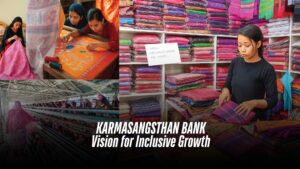
KARMASANGSTHAN BANK: Vision for Inclusive Growth
Karmasangsthan Bank is a unique state-owned social bank in Bangladesh, established in 1998 to turn unemployed youth into entrepreneurs. Its mission is to extend financial services to underserved communities and foster sustainable businesses. Literally translated as the “Employment Bank,” it empowers aspiring entrepreneurs to transform their ideas into sustainable ventures. Born from a national vision for inclusive economic development, the bank has dedicated itself to bridging the financial gap for underserved segments of society, particularly in rural areas. This focus on inclusive growth sets it apart from conventional commercial banks and makes it an essential instrument for national development. Under a government mandate and with initial capital of Tk 300 crore, Karmasangsthan Bank was created to tackle unemployment by funding small enterprises. Over time, government backing has expanded its loan pool to around Tk 4,500 crore, amplifying its reach. Its core purpose remains nurturing grassroots entrepreneurship and uplifting marginalised groups. Karmasangsthan Bank tailors its products to the needs of unemployed youth and small-scale entrepreneurs. Its flagship offerings include: Low-interest and interest-free loans for start-up ventures, microcredit schemes designed for first-time borrowers and special financing packages for persons with disabilities. The bank’s board unites professionals from financial and administrative backgrounds, ensuring strategic oversight and mission alignment. In November 2024, Dr AFM Matiur Rahman took the helm as the 14th chairman, while Arun Kumar Chowdhury guides daily operations as Managing Director. Their stewardship has driven both stability and innovation. With over 285 branches and 1,800 employees spanning every district and most upazilas, Karmasangsthan Bank brings its services to urban centres and remote villages alike. This footprint underscores its commitment to rural financial inclusion and fuels broader socio-economic development across Bangladesh. Beyond financing, Karmasangsthan Bank serves as a catalyst for community uplift. Its operations blend government policy, entrepreneurial mentoring, and localised development initiatives—proving that a bank can be a powerful tool for social transformation. To reach the unbanked, the bank is rolling out mobile banking apps, digital payment gateways, and online portals. These technologies bridge geographic divides, making services more accessible to rural and marginalised populations. Through initiatives like this, Karmasangsthan Bank continues to fulfil its mission of fostering a balanced economic structure by converting the population into productive manpower and reducing unemployment. Currently, Bangladeshi citizens aged 18 to 50 are eligible for loans up to Tk 5 lakh without collateral and up to Tk 75 lakh with collateral. Thanks to its outstanding performance across key indicators, Karmasangsthan Bank ranked first among state-owned specialised banks for the last two consecutive fiscal years. The government approved the construction of a 25-storey multi-purpose building atop a four-storey basement at a cost of Tk 260 crore. This project will be built on 37 decimals of land formerly belonging to the Times-Bangla Trust in Motijheel, Dhaka, now registered under the bank’s name. Since Karmasangsthan Bank operates under a similar model as Grameen Bank, the government should consider granting it full tax exemption. This measure would enable the bank to lower its interest rates further, providing greater support to unemployed and poor borrowers. Additionally, the nation would benefit from more affordable products, fostering a competitive market environment. Bank’s Performance Karmasangsthan Bank has lent Tk 18,000 crore to over 1.2 million youth, indirectly benefiting some 4.2 million people. Its recovery rate is about 96%. Currently, approximately 2,25,000 entrepreneurs—30% of whom are new each year and 40% of whom are women—tap into its schemes, with a total of about Tk 4,300 crore in outstanding loans. In the last fiscal year (July 2024–June 2025), Tk 2,838 crore was disbursed in self-employment loans to 1,25,000 entrepreneurs. Tracking job creation and enterprise growth provides clear evidence of its social footprint. The breakdown includes: Cattle fattening: Tk 1,595 crore (56.2%) to 76,744 individuals. Dairy farms: Tk 525.36 crore (18.5%) to 24,712 individuals. Fisheries: Tk 126.75 crore (4.5%) to 5,832 individuals. Poultry farms: Tk 15.43 crore (0.6%) to 745 individuals. Agro-based industries and nurseries: Tk 11.28 crore (0.4%) to 530 individuals. Commercial sector: Tk 160.35 crore (5.65%) to 7,309 individuals. Service sector: Tk 76 crore (2.65%) to 3,669 individuals. Small and cottage industries: Tk 53.84 crore (2%) to 2,531 individuals. Other sectors: Tk 275 crore (9.5%) to 2,100 individuals. During the same period, the bank earned Tk 408.37 crore in revenue against operational expenses of Tk 270.33 crore. Its pre-tax profit stood at Tk 138.04 crore, and it paid Tk 19 crore in advance corporate income tax. Customer Success Stories Rezaul Haque, a 45-year-old resident of Sundarpur in Paba Upazila (Rajshahi), transformed his life through commercial fish farming. With an initial loan of Tk 50,000 from the Rajshahi branch of Karmasangsthan Bank, Rezaul received subsequent training from the Department of Fisheries and the Department of Youth Development. Starting modestly, his venture expanded over 95 bighas of water bodies. Today, his investment has soared past Tk 1 crore, and he earns an annual income of about Tk 10 lakh. His journey not only provided him with financial stability but also inspired many local youths to explore similar opportunities, contributing to the region’s growing protein demand. Broadening Horizons in Aquaculture Another remarkable example is Borhan Uddin from Bagsara village. After securing a loan from the bank, Borhan invested Tk 75 lakh in a fish-farming business. With clear prospects for future expansion, his investment is expected to hit Tk 1 crore in the near future. His success story is a testament to how specialised loan products, combined with financial guidance, can spur rapid growth and foster entrepreneurship at the grassroots level. Retail and Small Business Beyond aquaculture, Karmasangsthan Bank has also empowered entrepreneurs in the retail and small-business sectors. For instance, Shahajahan Ali, owner of a local enterprise in Nawhata Municipality Market, has been utilising the bank’s credit support for over a decade to sustain and grow his business. Similarly, Mokbul Hossain, who runs a shoe store in the same market, successfully expanded his operations with consistent financial backing. Beef Fattening and Dairy To promote food security and create
Read More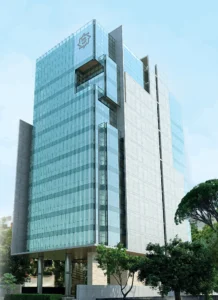
Shahjalal Bank First Green Building in the Banking Sector of Bangladesh
Shahjalal Islami Bank PLC is playing an important role in providing investment in all areas of manufacturing and service sectors, ready-made garments, trade financing, infrastructure and agriculture. Starting operations on 10 May 2001, the bank is running with 12,40,000 deposit and investment customers. As a third generation Islamic Shariah-based private commercial bank of the country, Shahjalal Islami bank plc has reached a strong position within a short span of time and has been playing a worthy role in the economic development. The financial base of this bank is very strong. The bank has currently been providing banking services to its customers with great reputation and trust through 140 branches, 4 sub-branches, hundreds of ATM booths and agent banking outlets, one offshore banking unit and priority centre across the country with 3,000 staffs. It has its iconic 17-storied building with basement on Gulshan Avenue in the capital Dhaka, where the bank’s head office operations are being conducted and being USGBC Lead Gold certified, this building is the first green building in the banking sector in the country. Renowned Architecht Prof. Shamsul Wares has designed the building.
Read More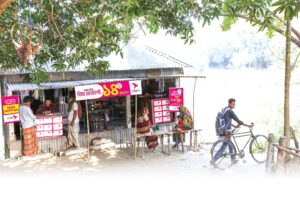
How bKash Empowers People Thru Financial Inclusion
bKash, a mobile financial services (MFS) provider in Bangladesh, is operating as a subsidiary of BRAC Bank Limited, under the authority of Bangladesh Bank. bKash has been providing fast, secure and convenient services via mobile phone to its more than 70 million verified customers for the past 12 years, authorities say. These customers transact more than Tk 20 billion every day. Only recently, people had to wait in long queues in the morning just to pay utility bills. And almost no financial services could be accessed from home comfortably. However, gone are those days, thanks to MFS providers like bKash. Now, millions of people no longer need to worry about paying bills or fees, doing savings, taking small loans or even receiving remittance from abroad – all these are now a matter of a few taps. MFS has evolved into a common platform for availing various financial services. As a result, the hassles people used to face earlier while seeking financial services are now considered a thing of the past. Financial services have reached the fingertips of people from all strata, making life easier. The dependence on digital transactions thereby increased manifold. It’s not just a means of sending money or paying bills anymore. It has become a complete financial service platform with a variety of financial products including merchant payment, savings, nano loan, remittance from abroad, bill payment and mobile recharge. It has become a part of lifestyle. bKash is now a member of every family in weal and woe. Though some other MFS providers have launched similar services, the term “bKash me” in the MFS arena is now the word of mouth that simply denotes money transfer. In its 12 years journey, according to the authorities, bKash has built the strongest network of 3,30,000 agents, commonly called as “Human ATMs” to take mobile financial services to the doorsteps of people in every corner of the country. These agents have not only succeeded in serving customers, but also been able to improve the living standard of their own families. Other MFS operators who came later, took leverage of this distribution channel established by bKash to reach customers. Bangladesh Bank, the regulator of this industry, has had proper guidance and policy support to help MFS flourish and become customers’ trusted partner for daily transactions. Besides, bKash’s service quality, continuous investment and innovation played pivotal role in garnering the trust of custromers. Of its 70 million user base, more than 45 per cent customers are female. Customers can avail its services such as cash deposit, cash withdrawal, money transfer, top-up, remittance, mobile recharge, payment and bill pay by dialing *247# and using Bkash app. To open an account a customer has to fill the prescribed customer registration form (KYC) with complete details. If the money goes to the wrong number it should be reported to 16247 immediately. bKash started operating as an MFS provider under the license of Bangladesh Bank on 21 July 2011 to cater financial services through mobile phones. Catering to people’s daily transactional needs with secured and time-saving solutions, bKash is empowering them to fulfil their dreams as well as taking the country forward During this time, bKash has brought the unbanked and underserved population into financial inclusion. Be it from a remote village or a small village market or a trading centre, a large number of customers has been connected to the formal financial channels through bKash. Currently, a total of 44 commercial banks are connected to the largest bank integration network of bKash. Thanks to seamless money transfer between bKash and banks, customers’ experience has radically changed, the authorities told the Ceramic Bangladesh. Earlier, going to a shop was the only way of recharging mobile phone numbers. In the span of an era, topping up all operators’ mobile numbers through bKash has become the most preferred way for millions of people in Bangladesh. A mountain of hassles for paying just a small amount of utility bill was a common place before. Now bKash has made all kinds of utility bill payment for electricity, gas and water easier for the common people. Besides, fee payment of many government services has become a matter of a few taps, they said. Since 2017, bKash has successfully disbursed allowances and stipends to around 10 million beneficiaries of many government initiatives and safety net programmes including primary education stipend, the Prime Minister’s Covid-time financial assistance, farmers’ incentive allowance under the Ministries of Agriculture, Fisheries and Livestock, maternity allowance, the Ministry of Disaster Management and also the salary, allowances and incentives of workers of the export-oriented industries. Bangladeshi expatriates from around 90 countries can send remittances through 80 international money transfer organisations via settlement in 17 local commercial banks. In 2022, nearly Tk 40 billion worth of remittance came to Bangladesh through bKash. Savings through bKash has also become very popular among the people. So far, around 1 .1 million customers have availed the savings schemes through bKash app. The hassles to save small amount of money is now gone due to such service. Not only ‘Savings’, digital nano loan can also be availed through bKash app. bKash, in association with The City Bank, introduced the country’s first-ever Digital Nano Loan in 2021. With this innovation, eligible bKash users can avail a loan ranging from Tk 500 to Tk 20,000 through bKash app. In the meantime, digital loan of Tk 3 billion has been given for a period of 3 months. bKash services save times, relief hassles Proprietor of M/S Taqwa Ceramics at Hatirpool Mohammad Zahid Hossain said, “Many customers want to make payment now after purchasing ceramic products through bKash as it saves their time and reduce other hassles. At the same time, it saves us from risk of handling counterfeit notes.” The digital transaction in business and other payments is going up day by day. As a result, the demand of bKash services increased as well. Another trader, Imran Hossain, manager of Ammar Sanitary of Bangla Motor, said they
Read More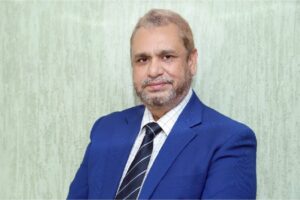
Bangladesh far away from tapping insurance potential
“The insurance sector’s share in the country’s gross domestic product (GDP) can be raised up to 10% from the current rate of 0.5% in the next 10 years, if the National Insurance Policy 2014 is properly implemented, and public awareness is created in this regard,” Managing Director and CEO of Pragati Life Insurance Limited (PLIL) Md Jalalul Azim told Ceramic Bangladesh (CB) in an exclusive interview. There is a huge potential for both life and a non-life insurance sector in Bangladesh as the country’s economy is booming. “But, we can’t exploit the potential due to image crisis, lack of proper monitoring by the Regulatory Authority, shortage of skilled manpower, and lack of awareness among many people,” Jalalul Azim said. Md Jalalul Azim Managing Director and CEO Pragati Life Insurance Limited There are a total of 82 insurance companies in Bangladesh, including 35 life insurance companies. Of these, the government has two companies– Jiban Bima Corporation and Sadharan Bima Corporation. However, the insurance sector does not flourish as per stakeholders’ expectations due to alleged violation of rules and regulations that leads to unethical practices at different levels. “We have more insurance companies compared to the need. For example, India is one of the world’s largest economies and has the highest population but there are only 52 insurance companies there. Steps of Pragati Insurance Pragati Life Insurance Limited (PLIL) is a third generation company, and Pragati Insurance Limited (PIL) is the first generation company in the country. Considering the overall situation, Pragati Insurance companies are in a better position compared to others. Pragati General Insurance Company along with others got a license in 1985. After achieving success through dynamic activities, the company’s entrepreneurs launched Pragati Life Insurance Limited in 2000. It started with a paid-up capital of Tk 30 millionagainst an authorised capital of Tk 250 million. However, the second generation insurance came in 1990, and the fourth generation in 2013-14. Pragati have 371 branches across the country. The life insurance premium was Tk481.76 crore in 2022 and met claims of Tk315.75 crore in the same year. In view of premiums, “we are now in 7th position among 33 insurance companies. We are in the capital market too. Our share price is the second or third highest in the stock market. Every year, we pay dividends to our shareholders.” The Pragati Life Insurance CEO, Mr Jalalul Azim, said, “We pay insurance claims properly without any hassle while many companies can’t pay their customer’s claims. It seems owners of many insurance companies don’t have a proper idea about insurance operations. So, they can’t pay their client’s claims amply. As a result, a negative idea among many people has been created in our insurance sector.” Overall, he thinks, Pragati is one of the better companies in the country. Why will people take insurance? In general insurance, clients can demand their claims after an accident. On the other hand, clients can demand the claim in both situations after the ending of insurance tenure and accident in life insurance, the Pragati CEO said. Common people get more benefits if they take insurance from reputed companies. Accidents may occur at any time in life. The victim’s family will get a handsome amount if a member takes insurance. Besides, if industrial units are burnt, ships are sunk, and airplanes are devastated from time to time and if businesses take insurance, it can overcome financial crises somewhat. Hence, there is a difference between banking and insurance systems. Banks can give a fixed profit to customers after an estimated period. But an insurance company can give a guarantee. “We do insurance over Tk. 50,000. And, if someone does insurance of Tk. 1 crore, we do Tk. 10 lakh insurance on our own and we do reinsurance at a foreign company for the rest of the amount.” As it is a Muslim-majority country, the demand for Islamic insurance is increasing. But there is a lack of skilled manpower, and policy here. There is no skilled person at the Shariah council to operate the Islamic insurance system. “We have also a service named after Takaful. A policy is very necessary for Islamic insurance.” Insurance for ceramic manufacturers The country’s ceramic manufacturers have to import different types of raw materials to manufacture ceramic products. During the import of the materials, accidents may occur at sea or on roads. For temporary financial support from damage, businesses should take insurance, Mr Azim also said. As per the government direction, import and export businesses have to take non-life insurance during Letter of Credit (L/C) opening. However, every businessman should take the benefit as it has a priority in the globe. Lack of skilled manpower Insurance Development and Regulatory Authority (IDRA) issued a rule for appointing Managing Director (MD) and Chief Executive Officer (CEO) but such highly qualified officials are not available in the market. Insurance-related technical departments also lack skilled manpower to operate insurance companies here. For example, Actuary is important in the insurance sector but there is only one actuary professional who is now 80 years of age. “So, our sector can’t flourish as per the potential.” There is also unhealthy competition in the industry. The government has fixed premiums for general insurance, but some companies offer commissions of up to 50 percent to customers. “There is no reinsurance company in Bangladesh. If the company does not do reinsurance how will it meet customers; claims? So they find a tricky way, he added.” Insurance companies can’t meet the claims of clients without maintaining professionalism. “IDRA installed observers in insurance companies. But if they don’t have money how they will meet the claims?” he said. To bring discipline in the sector, all companies must be brought under rules and regulations. Otherwise, public trust won’t build and develop the sector, the MD said. Sector growth decline Despite economic growth, there is no such progress in the insurance sector. The premium of insurance companies is 0.5 percent of GDP contribution which was 1.0 percent five years ago
Read More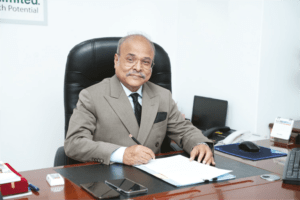
Enhanced engagement between Banks and Ceramic Manufacturers essential : NBL DMD
National Bank Limited (NBL) Deputy Managing Director Hossain Akhtar Chowdhury tells with Ceramic Bangladesh an exclusive interview that the ceramic sector needs a huge investment in the future.
Read More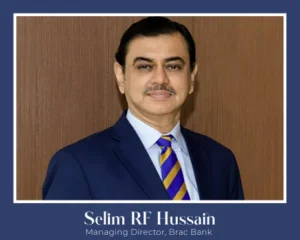
Ceramic industry has high potential to flourish: Selim RF Hussain
In an Interview with Ceramic Bangladesh, the Brac Bank MD & CEO says the growing industry can help fulfill Bangladesh’s sustainable development goals. Selim RF Hussain is a Bangladeshi career banker with over 35 years of diversified local and international banking experience. He is currently heading Brac Bank Limited, one of the country’s leading full service commercial banks, with an asset base of approximately US$ 5 billion, and one that is known for its particular focus on the SME segment. Mr. Selim joined Brac Bank in November 2015, and within a relatively short period, has led the bank to the top tier of the 60 odd scheduled banks in Bangladesh. He has been elected Chairman of the Association of Bankers, Bangladesh (ABB) for the period 2022-23. He is a member of the Governing Board of the SME Foundation, an apex semi-government institution spearheading SME development. He is a member of the Governing Board of the Financial Alliance for Women, an international network of financial institutions dedicated to championing the female economy. Mr. Selim is also on the Board of the Global Alliance for Banking on Values (GABV), an international network of banks that use finance to serve people and the planet. Mr. Selim also represents Brac Bank in multiple Brac Bank subsidiaries through board directorship – at Brac EPL Investments Ltd, Brac EPL Stock Brokerage Ltd, Brac Saajan Exchange Ltd and Brac IT Services Limited. He is the Chairman of the Board Audit Committee of bKash, Bangladesh’s largest mobile financial service company, and also the Vice-Chairman of the Industrial Infrastructure Development Finance Company (IIDFC), a non-banking financial institute. Ceramic Bangladesh (CB): Would you please tell us something about Brac Bank and its inception? Selim RF Hussain: Brac Bank started its journey in 2001 as a private commercial bank focussing on small and medium enterprises (SMEs). Our visionary founder – Sir Fazle Hasan Abed KCMG established the bank to facilitate easy access to formal f inancing for the grassroots SME entrepreneurs who are usually left out in the traditional banking system. The bank has pioneered small-ticket unsecured loans to bring the unbanked missing middle under the banking umbrella. Over the years, it has emerged as the country’s largest financier of collateral-free SME loans. With a dynamic network of 187 branches, 456 SME unit offices, 373 ATMs, and 800 Agent Banking outlets across the country, Brac Bank offers seamless banking services for Retail, SME, and Corporate segments serving 1.3 million customers. The majority shareholding of the bank belongs to Brac, the largest non-government organisation in the world. CB: What has actually enabled the bank to rise to the top? Selim Hussain: Brac Bank is a different bank altogether in the banking sector. It is the only bank in the country, with most shareholdings belonging to institutional investors. Its Board is comprised of independent directors who are expert professionals in their f ield. This organisational structure gives the bank a solid foundation to become a standard bearer in governance, transparency, ethics and compliance. Brac Bank’s superior performance indicators in the Bangladesh Banking Sector are reflected in the highest market capitalisation, the highest international investor shareholding in the local banking sector, and the highest bank credit.rating of all banks in the country from both international rating agencies, S&P and Moody’s. The bank leads the local banking industry in nearly all financial metrics and is a benchmark for corporate governance and values-based banking. CB: How is Brac Bank different from other banks? Selim Hussain: Brac Bank focusses on SME banking. It provides small-ticket and collateral-free loans to SME entrepreneurs, an attribute that sets the bank apart in Bangladeshi banking sector. The bank plays a vital role in bringing the unbanked missing middle under the banking system. With its SME Banking, Agent Banking and Women Banking propositions, Brac Bank contributes significantly to financial inclusion in the country. CB: What are the services you provide to your premium customers? Selim Hussain: We bring exclusive perks to our high-value customer segment. Premium Banking customers enjoy a host of benefits and privileges, including Dedicated Relationship Managers, Luxurious Lounges, One-Stop Service, Preferential Fees and Charges, Doorstep Service, Lifestyle Benefits, Exclusive Card Privileges, Customer Value Propositions, Priority at Call Centre Service. The customers are entitled to exclusive deals on shopping, dining, entertainment, healthcare, and special Infinite, Signature and Platinum credit card special offers. CB: What facilities are you providing to the local manufacturing industries? Selim Hussain: In its 21 years of operations, Brac Bank contributed significantly to industrialisation in Bangladesh. Our Corporate Banking provides Working Capital, Capital Machinery, Project Financing and Lease Financing, Cash Management and Transaction Banking for large and emerging corporate organisations. Under SME Banking, the bank extends Unsecured Loan, Secured Loan, Women Entrepreneur Loan, and Secured Convenience Loan, leading to small-scale industries’ growth. CB: How do you see yourself as a partner in the growth of Bangladesh’s ceramic industry? Selim Hussain: The ceramic industry has high growth potential. Apart from meeting domestic demand, our ceramic manufacturers also export and earn precious foreign currency. This potential has led to renowned corporates making big investments in this manufacturing sector. Brac Bank provides banking and financing support to large-scale ceramic industries and small-scale ventures with customised solutions. CB: Do you have plans for more investments and providing more facilities to the ceramic industry? Selim Hussain: Being an SME-focussed bank, Brac Bank patronises grassroots entrepreneurs. We have already financed many small-scale ceramic industries and witnessed remarkable success. For example, our finance to Clay Image has created many jobs, especially for women artisans. We know that the growing ceramic industry can help fulfill sustainable development goals of No Poverty, Decent Work and Economic Growth, Industry, Innovation and Infrastructure. So, we stand for this vibrant and potential sector, helping it to flourish further. CB: Where would Brac Bank be in 10 years down the line? Selim Hussain: With modern technology, the banking sector is changing fast. We reckon, in a decade’s time, banking infrastructure will see radical change. The country will go cashless.
Read More
